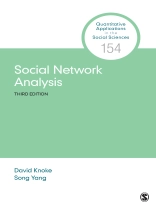David Knoke and Song Yang′s Social Network Analysis, Third Edition provides a concise introduction to the concepts and tools of social network analysis. The authors convey key material while at the same time minimizing technical complexities. The examples are simple: sets of 5 or 6 entities such as individuals, positions in a hierarchy, political offices, and nation-states, and the relations between them include friendship, communication, supervision, donations, and trade. The new edition reflects developments and changes in practice over the past decade. The authors also describe important recent developments in network analysis, especially in the fifth chapter. Exponential random graph models (ERGMs) are a prime example: when the second edition was published, P* models were the recommended approach for this, but they have been replaced by ERGMs. Finally, throughout the volume, the authors comment on the challenges and opportunities offered by internet and social media data.
Mục lục
Series Editor’s Introduction
About the Authors
Acknowledgments
Chapter 1. Introduction to Social Network Analysis
Chapter 2. Network Fundamentals
2.1. Underlying Assumptions
2.2. Entities and Relations
2.3. Networks
2.4. Research Design Elements
Chapter 3. Data Collection
3.1. Boundary Specification
3.2. Data Collection Procedures
3.3. Cognitive Social Structure
3.4. Missing Data
3.5. Measurement Error
3.6. Collecting Network Data
Chapter 4. Basic Methods for Analyzing Networks
4.1. Network Representation: Graphs and Matrices
4.2. Nodes: Centrality, Power, Prestige
4.3. Dyads: Walk, Path, Distance, Reachability
4.4. Subgroups: Transitivity and Cliques
4.5. Whole Networks: Size, Density, Centralization
4.6. Structural, Regular, and Automorphic Equivalence
Chapter 5. Advanced Methods for Analyzing Networks
5.1. Ego-Nets
5.2. Visualizations: Clustering, MDS, Blockmodels
5.3. Two-Mode and 3-Mode Networks
5.4. Community Detection
5.5. Exponential Random Graph Models (ERGMs)
5.6. Future Directions in Network Analysis
Appendix: Social Network Analysis Software Packages
References
Index
Giới thiệu về tác giả
Song Yang (Ph.D., University of Minnesota, 2002) is a professor of sociology and criminology at the University of Arkansas. His teaching and research areas are social network analysis, including business, economic, and organizational networks, work and organization studies, and social statistics. He published many articles and chapters, with the most recent ones on Journal of Business Research and Nonprofit and Voluntary Sector Quarterly. He has written several books, including Social Network Analysis (2008, with David Knoke), The Invisible Hands of Political Parties in Presidential Elections: Party Activists and Political Aggregation from 2004 to 2012 (2013, with Andrew Dowdle, Scott Limbocker, Patrick Stewart, and Karen Sebold), and Social Network Analysis: Methods and Examples (2016, with Franziska Keller, and Lu Zheng).












